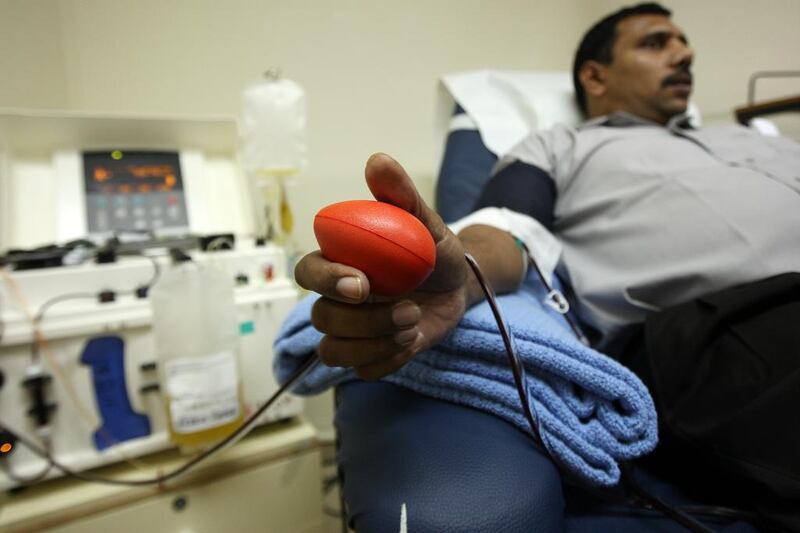ABU DHABI // Donate blood before you travel this summer.
That is the message from blood banks in Abu Dhabi and Dubai who are anticipating plummeting stock levels in the coming weeks.
Ramadan and the summer months are traditionally the worst time of year for donations as those fasting do not donate, while expatriates often travel.
With the summer timing of the holy month, donations are anticipated to be lower than ever. This is despite a constant need for regular blood donors to help those with chronic conditions, such as thalassaemia, sickle-cell anaemia and cancer patients.
“This is the time where people are not around, so we do not expect many donations,” said Dr Laila Al Shaer, head of the Dubai Blood Donation Centre. The blood centre relies on between 150 and 200 people donating every single day.
“In Ramadan all the time we are trying to reach this number,” she said. “The difference with this month of the year is most of the people are scheduling their time off. Most of the people are on vacation and are not around.”
Because many expatriates leave the UAE during the holy month, Dr Al Shaer is urging those who can donate to do so before they depart.
Dr Al Shaer said employees at the blood bank often have to reach out to regular donors to help boost stocks during difficult periods.
In anticipation of the drop in donors, the blood bank increases its efforts to encourage more donors every year in the weeks leading up to Ramadan.
She is hoping a similar push this year will help the blood bank cope during July.
About a third of all blood stocks at the centre help those with thalassaemia, a blood disorder that affects haemoglobin and the red blood cell count, she said.
Blood banks only store freshly-donated blood for a maximum of six weeks but thalassaemia patients require blood that is as fresh as possible for greater benefit and so rely on regular donations.
“For thalassaemia patients they need fresh blood – maximum one week or five-days-old. That is why – even if we have some in our stock it will not be useful to them.”
Of the 43,000 units of blood collected at the blood bank last year, about 14,000 units were dedicated to thalassaemia patients.
After thalassaemia patients, the biggest strain on the blood bank is demand from the Rashid Hospital Trauma Centre. Units of blood are used to treat emergency patients.
With the centre under expansion, as well as more and more health facilities springing up across the emirates, the demand for blood stocks is ever increasing, she said.
Traditionally the blood bank has received an extra 2,000 donated units of blood year-on-year. The extra supplies has counteracted rising demand.
“But I think we have plateaued at this stage now,” said Dr Al Shaer.
Dr Naima Oumeziane, head of the Abu Dhabi Blood Bank (ADBB), agreed that Ramadan is typically the worst time of year for blood donations.
However those that do donate can help save a life, she said.
Like the Dubai Blood Donation Centre, ADBB has also stepped up a drive to encourage people to donate and has also amended its opening hours to help.
“We are working to prepare for Ramadan and summer time. We have intensified our blood campaigns to increase our blood inventory levels,” said Dr Oumeziane.
Anyone aged 17 or over and with a clean bill of health can donate blood and the procedure takes less than 30 minutes, she said.
“They can donate and save lives. Do it, try it. It doesn’t hurt and it helps in saving others.”
jbell@thenational.ae





